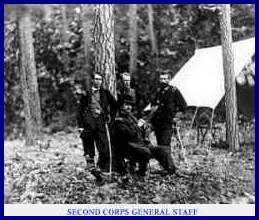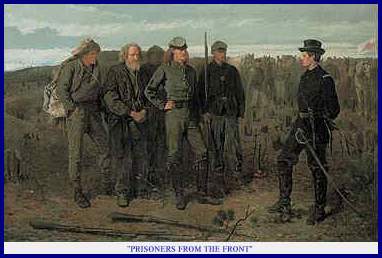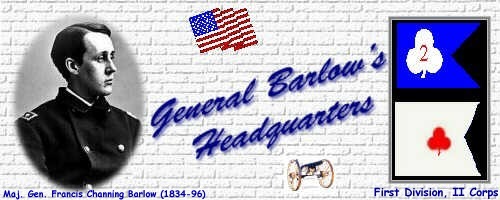
Barlow leaning on tree in Wilderness Campaign |

Barlow as a model for Winslow Homer's "Prisoner's From The Front." |

Barlow leaning on tree in Wilderness Campaign |

Barlow as a model for Winslow Homer's "Prisoner's From The Front." |
Visit

Subject: Re: Barlow and Gordon
From: "C. W. Wachsmuth" <wayne111@epix.net>
To: "GDG" <gettysburg@gdg.org>
The recent discussion about the authenticity of the story told by John
B.
Gordon concerning his relationship with Francis C. Barlow and his wife
Arabella at Gettysburg has driven me to examine my library to see what
information may be gleaned from it to help shed a bit more light on
the
tale.
I find that Barlow was in his 27th year, engaged in the practice of
law
in New York City when the war broke out. He enlisted as a private in
the
20th NYSM on the 19th of April, married Arabella Griffith the next
day
and left with his unit the following day. At the time of the wedding
Arabella was 10 years Francis senior and had been described by George
Templeton Strong as "certainly the most brilliant, cultivated,
easy,
graceful, effective talker of womankind, and has read, thought, and
observed much and well."
At Gettysburg Barlow was hit in the left side and unhorsed. Left behind
his retreating force he was indeed removed from the immediate scene
of
fighting by Confederates. He specifically mentioned Lt. A. L. Pitzer
of
Early's staff although he would mis-spell Pitzer's name as Pitzera
in the
7 July letter he wrote to his mother. In that rather detailed letter
wherein he describes at length his wounding (he had been hit by a spent
round in the back and another round had grazed a finger as he lay on
the
field) and removal from the immediate front. He makes no mention of
Gordon which would seem to be contradictory with Gordon's account which
describes a rather lengthy conversation with Barlow as he was being
removed from the field.
Gordon related that Barlow told him that Arabella was with the army
and
asked that she be notified. Other sources indicate that Arabella was
working at a Christian Commission hospital in Maryland at the time
and
given that, it would have been unlikely that she could have gotten
to the
field by the evening of the 1st. General Howard mentions Arabella
arriving at his headquarters (but does not give a good date) and asking
how to get through the lines and there are accounts from some
Confederates who claim to have seen her in a carriage carrying a white
flag while an account by young David Skelly has her on horseback escorted
by a couple of Confederate soldiers on the 3rd of July.
In any case Barlow's own letter to his mother on 7 July makes absolutely
no mention of Arabella arriving to help care for him and there is no
solid information to show on which date (if any) she found her husband.
Arabella died in July of 1864 from typhoid or typhus depending on which
account one reads, but at least we can be sure that the poor woman
did
not survive the war.
After the war Barlow married Ellen Shaw, who was Robert Gould Shaw's
sister and worked in the field of politics and law until his death
in
1896.
The full blown account by John B. Gordon on the incident at Gettysburg
did not surface until 1901, in a lecture titled "Last Days of the
Confederacy". The account, filled with the florid phrases common to
the
end of the Victorian era describes helping Barlow off the field and
sending a pass through the lines for Arabella, and having been awakened
by a picket that night saying that a lady had passed through the lines
(who proved to be Arabella) and needed help in finding her husband.
Given
the other accounts which contradict that story it would seem that a
rather large grain of salt must be taken with it.
Gordon then goes on to say that he assumed that Barlow had died and
was,
of course, pleasantly surprised when they met after the war, each
thinking the other had been killed.
While Gordon's cousin General J. B. Gordon had been killed in the battles
near Richmond and that fact had been announced in the papers, it would
hardly seem that each of the principals would have been unaware of
each
other since their units fought one another during 64 and 65. Indeed
Barlow's division was one of the units that Gordon sparred with on
the
retreat from Petersburg to Appomatox.
Taken as a whole and given that the lecture was given some five years
after Barlow's death it would seem that the Barlow/Gordon Incident
owes
more to the imagination of John B. Gordon than to established fact.
Regards,
Wayne
Esteemed member "C. W. Wachsmuth" <wayne111@epix.net> contributes:
On the 7th of July Barlow wrote an extensive letter to his mother while
he was hospitalized. In that letter (a copy of which is on file in
the
park archives) he describes at some length his wounding. He specifically
says that he was taken off the field by Lt. Pitzer of Early's staff
and
some other men. He makes absolutely no mention of encountering Gordon,
which given the detail he gives for the event is, I think, significant.
He also makes absolutely no mention of Arabella. Since at the onset
of
the battle Arabella seems to have been working in a Christian Commission
hospital near Baltimore and it would have taken some time for her to
get
news of her husband's wounding then travel to Gettysburg, it seems
unlikely in the extreme that she would have been passed through the
lines
after dark on the 1st as described by Gordon. As Barlow makes no mention
of her in his 7 July letter the possibility exists that she had not
arrived by that date, although it is possible that she had done so
by
that time.
Regards,
Wayne
All in All quite an admirable history...we should all be so lucky eh?
Humbly..
Ed...
From: "James F. Epperson" (epperson@s10.math.uah.edu)
Subject: Barlow
I confess to being a Barlow fan, even if he was (a) a lawyer, (c) from New York, and (c) something of a snob with regard to his German troops. Despite this, there is something appealing about a man who works his way up from private to general as quickly as he did. He also was eccentric, which the AoP needed more of, compared to the ANV. I mean, wearing that flannel shirt all the time and beating on stragglers with his cavalry saber. The famous II Corps picture from spring, 1864, showing Gibbon, Birney, Barlow, and Hancock, is one of my favorites. If memory serves, Gettysburg was his first battle as a division commander, so I am willing to excuse his failures on that account, somewhat.
So, what is the consensus? Is Epperson being a hopeless romantic, or is Barlow really a decent officer who had a bad day at Gettysburg? (Inquiring minds want to know . . . )
Jim Epperson
From: ENordfors@aol.com
Subject: Barlow/boy general/Correction/Question
In a message dated 96-02-02 03:33:35 EST, Mr Ed the talking Horse wrote:
During GB he was a Brig Gen. in the XI Corps.
Humbliest of Apologies to all... Altho the Good Gen was indeed a Brig
Gen. in the XI Corp he was indeed a Division Commander as well....this
is my first lasting impression of conflicting information between sources...why
I did not use Coddington first I may never know...
>From the "Historical Times, Illustrated, Encylopedia of the Civil
War" I pulled the fact that he was a Brig Gen and Brigade Commander...upon
my good friend Paul's watchful eye fell this mis-information...in grabbing
my Coddingtons and checking the Official Rosters under the XI Corps...bigger
than life...Brig Gen Barlow, First Division Commander...XI Corp....sorry
for this...all remaining information is fine... And now I find another
good Mainer steps in when Barlow goes down...must be very, very famous
(this is for Eric (g)) Brig Gen Adelbert Ames.. hmm upon reading his history
he was somewhat decorated...6 brevet ranks..Medal of Honour...all this
said I do not have an opinion of his Command abilities and given Howards
unique abilities for getting recognition I will not assume Ames to be anything
until I read further...
Question: related (sort of)...
Does anyone have handy the dates of death of W.S. Hancock and F.C.
Barlow.. I have early 1886 on Hancock and Jan 1896 on Barlow...but I would
like to pinpoint the dates if available...
Thanks ahead of time for the help...
One last Question for today...I promise (as my noses starts growing):
Can anyone elaborate on the care given Barlow by Gordon and how Barlow
was ableto re-join the USA under Grant...Barlow was not considered a POW.??
I realize he was left for dead...I guess I need further light....References
only are perfectly fine...I just need to understand this situation?
E-mail me at ENordfors@aol.com...yup I paid my bill this month..is OK...(vbg)
Humbly
Ed..
From: benedict@ns.moran.com (Benedict R Maryniak)
Subject: RIP, Arabella G Barlow
Barlow married Arabella Griffith April 20 1861, the day before he marched off with the 12th NYSM as a private. Arabella joined the US Sanitary Commission in the summer of 1862, although she would probably have spent most of her time in hospitals because her husband seemed to be recovering from wounds through most of the war. She indeed died 7-27-1864 in Washington DC of a fever contracted in her hospital work. Frannie then married into the Shaw family (as in Robert G Shaw) and was a co-founder of the American Bar Assn .
Dzouave5@aol.com says:
I think one reason many recent students have doubted the veracity of Gordon's later account has to do with the fact that although, according to Gordon's version, the two generals had a discussion, that Barlow makes no mention of this in his July 7 letter to his mother. To excerpt from this:
"A force came up against our front in line of battle with supports in the rear. We ought to have held the place easily, for I had my entire force at the very point where the attack was made. But the enemies skirmishers had hardly attacked us before my men began to run. No fight at all was made. Finding that they were going I started to get a head of them to try to rally them and form another line in the rear. Before I could turn my horse I was shot in the left side about half way between the arm pit and the head of the thigh bone. I dismounted and tried to walk off the field. Everybody was then running to the rear and the enemy were approaching rapidly. One man took hold of one shoulder and another of the other side to help me. One of them was soon shot and fell. I then got a spent ball in my back which has made quite a bruise. Soon I got too faint to go any further and lay down. I lay in the midst of the fire some five minutes as the enemy were firing at our running men. I did not expect to get out alive. A ball went through my hat as I lay on the ground and another just grazed the forefinger of my right hand."
Now the key part:
"Finally the enemy came up and were very kind, Major Pitzera, Staff officer of Gen. Early had me carried into the woods and placed on a bed of leaves. They put some water by me and then went on to the front again."
I think that many have concluded that since Barlow does not mention Gordon that the incident did not occur. I think that, just maybe, some brief exchange took place, as the presence of a fallen and possibly fatally wounded Federal general would have excited notice on Gordon's part, if he was passing by. However Gordon had a great deal to attend to, and I suspect that at the very least he "embellished" the exchange in later years.